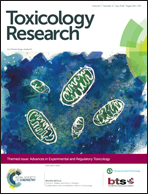Collaboration and competition: ethics in toxicology
Abstract
From animal research through adverse events in clinical trials to health scares around food contamination, toxicology has frequently been a focus of scientific and societal concern. As these concerns shift with each new drug, new technology or public health scare, how can toxicology stay current, relevant and ethical? Two of the biggest ethical challenges in pharmaceutical toxicology are the use of animals in testing and the high safety-related attrition rates in new drug development. Both of these require progress in the discipline that will only be driven by research funding. Yet, very little is invested in these two fields compared with investment in new efficacy models, new disease targets and new technologies. How can this be addressed? Here, we explore current paradigms in toxicology that may have the potential for perceived or actual unethical ramifications. We discuss the underpinnings of such practices and make recommendations for change around peer review, resourcing, transparency and data sharing. These ideas build on the analysis presented in the 2004 Paton Prize lecture (Purchase, 2004) where issues around conflict of interest (COI), collaboration and competition in the context of ethical behaviours were highlighted. These areas are clearly relevant to many aspects of scientific research but here we focus on toxicology and specifically toxicology in the pharmaceutical industry.

- This article is part of the themed collections: Recent Review Articles and Advances in Experimental and Regulatory Toxicology


 Please wait while we load your content...
Please wait while we load your content...